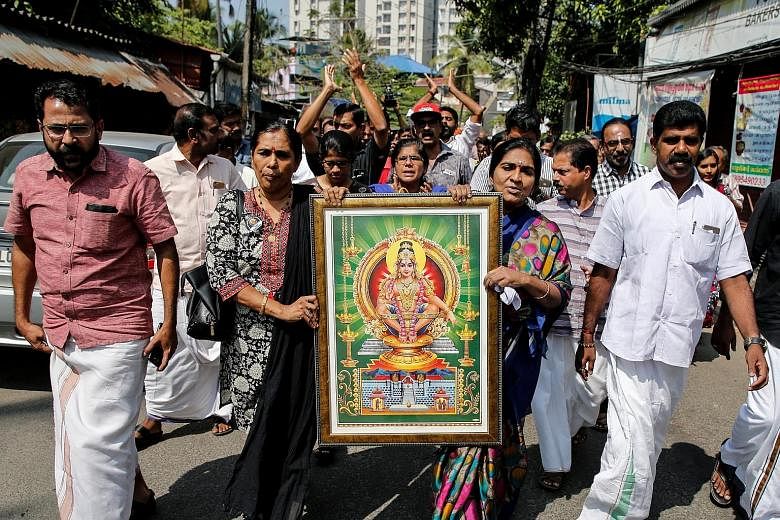Two women created history by entering the Hindu temple of Sabarimala yesterday, offering prayers to the bachelor god and smashing the longstanding practice of barring women from entering the temple.
But their feat triggered protests in different parts of the southern state of Kerala, where the temple is located, by people who maintained that the act went against the temple's tradition.
Women between the ages of 10 and 50, or of menstruating age, were banned out of tradition from stepping into the temple, which is devoted to Lord Ayyappa, a deity considered a celibate.
The Supreme Court lifted the ban in September last year, ruling that it amounted to gender discrimination.
But despite the decision, Hindu groups and devotees, including women, held violent protests that earlier prevented the women from entering the hilltop temple, which draws millions of visitors every year.
At midnight on Tuesday, Ms Bindu Ammini, 42, and Ms Kanaka Durga, 44, both dressed in all-black attire with their heads covered, started their trek to the temple.
They reached the temple at around 3.45am yesterday, according to reports.
A video of the women making their way into the temple complex and walking towards the sanctum sanctorum while being protected by the police was widely shared on WhatsApp and shown on television. The two women had to abort an earlier attempt due to the protests in the area.
"We arrived in Pamba at midnight. We went to the police station, but went ahead with our trek without police protection. We did not face any protests from any quarters," Ms Durga told television channel CNN-IBN.
Kerala Chief Minister Pinarayi Vijayan confirmed that the women had entered the temple under police protection. They are understood to have entered through a separate VIP entry.
The state has witnessed violent protests by devotees and right-wing groups opposing the lifting of the ban. Over the past three months, at least two dozen women, including journalists, were turned away by protesters who blocked roads and checked vehicles to ensure women did not enter the temple premises.
On Tuesday, women formed a 620km human chain for gender equality over the Sabarimala issue in a protest organised by the Communist Party of India (Marxist), which is part of Kerala's ruling coalition.
The Bharatiya Janata Party called it a "black day", with different groups warning of trouble in the coming days.
Police yesterday used water cannon and tear gas to disperse protesters who had gathered, including in front of the state secretariat in Thiruvananthapuram, Kerala's capital.
After the two women's visit, priests closed the temple's sanctum sanctorum to perform a purification ceremony.
"The temple has been washed and purification rituals were done. We will organise a huge protest against this and continue the legal battle," said Mr Rahul Easwar, president of the pro-tradition group Ayyappa Dharma Sena, referring to a decision by the Supreme Court in November to review its ruling.
The annual Sabarimala pilgrimage is one of the world's largest, with millions of male devotees trekking barefoot up a steep hill to visit the shrine. They also undertake a rigorous 41-day fast, which includes observing a vegetarian diet and practising celibacy.
On Tuesday, Prime Minister Narendra Modi indicated in an interview with ANI News that traditions are important.
"India is of the opinion that everyone should get justice. There are some temples which have their own traditions, where men can't go. And men don't go," he said.
Activists were critical of the purification ceremony.
"The entry of women is in keeping with the Supreme Court order. But the purification ceremony is nothing but a form of untouchability, which is prohibited by the state," said Ms Kavita Krishnan, a member of the Communist Party of India politburo. "Whatever it is, two women entered and have given prayers."

